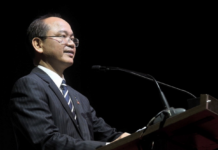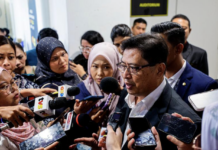PUTRAJAYA, Nov 23 — Visual informatics is undoubtedly one of the key elements that will enhance the growth of many traditional and new industries, said Communications and Multimedia Minister Tan Sri Annuar Musa.
These include the agriculture, manufacturing, healthcare and communication sectors and areas such as energy informatics, drone technology, smart technology and cyber security, he said.
In his speech at the 7th International Visual Informatics Conference 2021 (IVIC’21) hosted by Universiti Tenaga Nasional (UNITEN) near here today, Annuar, however, stressed that any technology adopted must take the users into consideration.
“I feel that we need to put ourselves back on reality check. We need to make sure that whatever technology we adopt has taken into consideration the people that are going to use it, especially the marginalised society such as the Orang Asli, those in Sabah and Sarawak, Persons with Disabilities (PwD) and the B50 group,” he said.
He, meanwhile, urged universities and centres of excellence to collaborate with the industry and government to enrich digital education and create new programmes to accelerate the country’s economic growth.
This is because Malaysia still lacks the human resource technology talent supply and demand to fit new and future jobs that match the expected skills and knowledge in the Fourth Industrial Revolution (4IR) era, he said.
He added that through the 12th Malaysia Plan (12MP), the government’s digital economy transformation plan included injecting greater creativity, innovation and promotion of data science skills and computational thinking skills throughout the education system.
“This will equip students with knowledge, technology and higher-order thinking skills, as well as will-power and transferable skills that will enable them to be agile in order to move between industries and, thus, be more resilient to new jobs,” he pointed out.
As Malaysia moves towards being a digital data-driven nation, Annuar said many initiatives are being undertaken to leverage opportunities in emerging technologies so as to attract investments into the country.
These included the human capital development in data science initiative, national data-sharing initiative and #SayaDigital movement by the government through various agencies such as Malaysia Digital Economy Corporation (MDEC), the Malaysian Administrative Modernisation and Management Planning Unit (MAMPU) and the Malaysian Communications and Multimedia Commission (MCMC).
Annuar said Malaysia had embraced new technologies in both the public and private sectors, which included the development of e-government, telehealth and multipurpose smart card, as well as the establishment of smart schools with more than 4,500 companies and institutions having received the MSC (Multimedia Super Corridor) status.
“As of 2020, the MSC Malaysia programme has generated revenue of more than RM500 billion while the digital economy in Malaysia is targeted to achieve RM75 billion in gross national income contribution from the digital transformation initiatives by 2021,” he said.
He said MDEC would also drive the development of MSC 2.0 in order to boost the country’s digital economy and attract more digital investments.
Annuar also launched the UNITEN Research Roadmap 2021-2025, which will become the main source of reference for all researchers in the university to synergise and synchronise efforts in research, development, innovation and commercialisation activities towards bringing UNITEN to become a global energy-focused university in the next five years.
The three-day IVIC’21, which kicked off today, focuses on visualisation, engineering, cyber security and machine learning and energy informatics.
















